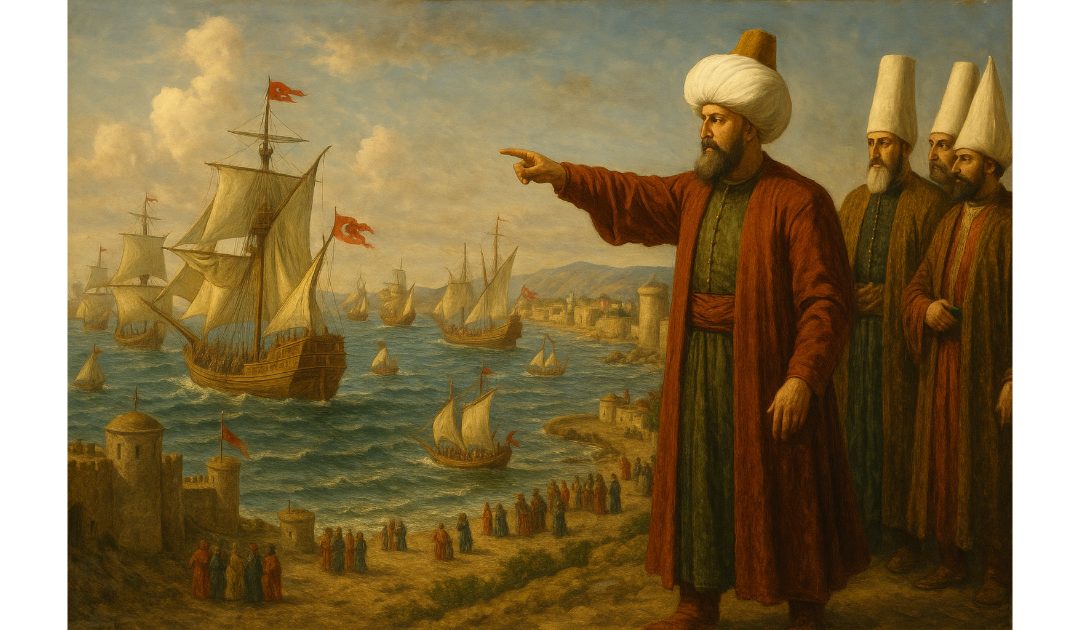Called to Account, the fourth book in the Sir Anthony Standen Adventures, features anti-semitism as its theme. The seemingly endless conflict between the Jewish state of Israel and its Islamic neighbours is on our minds and TV screens. Yet it hasn’t always been that way. Bayezid II, also known as Bayezid the Just, was the eighth Sultan of the Ottoman Empire, reigning from 1481 to 1512. His rule marked a period of relative peace, consolidation, and cultural flourishing, following the expansive military campaigns of his father, Mehmed II, the conqueror of Constantinople.
Early Life and Ascension
Born in 1447, Bayezid was the son of Sultan Mehmed II and Gülbahar Hatun. He received an extensive education in both the military and administrative sciences, as was customary for Ottoman princes. From an early age, he served as the governor of various provinces, gaining crucial experience in governance and military affairs.
Upon Mehmed II’s death in 1481, a succession struggle erupted between Bayezid and his younger brother, Cem Sultan. This rivalry was intense and briefly plunged the empire into instability. Bayezid ultimately secured the throne with the support of the Janissaries, the elite military corps, while Cem fled to Europe, seeking refuge with the Knights Hospitaller and later the Papacy. His brother’s captivity in Europe became a diplomatic concern for Bayezid throughout his reign.
Domestic Policies and Administration
Bayezid II is often remembered for his focus on internal stability and administrative reforms. Unlike his father’s aggressive expansionist policies, Bayezid prioritised consolidating the empire’s vast territories and enhancing its administrative efficiency. He improved the legal system, promoted justice, and worked to curb corruption within the government.
A devout and pious ruler, Bayezid was committed to Islamic principles, yet he demonstrated remarkable tolerance towards non-Muslim communities within his realm. This approach fostered a climate of coexistence and economic prosperity, as diverse groups contributed to the empire’s cultural and commercial life.
Cultural and Artistic Achievements
Bayezid II was a great patron of the arts, architecture, and sciences. Under his rule, the Ottoman Empire saw a flourishing of cultural life. He commissioned numerous architectural projects, including mosques, bridges, and public works that beautified cities across the empire. The Bayezid II Mosque in Istanbul, completed in 1506, stands as a testament to his architectural legacy.
He also supported scholars, poets, and artists, contributing to the development of Ottoman literature and fine arts. The Sultan’s court attracted intellectuals from diverse backgrounds, fostering an environment where scientific inquiry and artistic expression thrived.
Foreign Relations and Military Campaigns
Though Bayezid preferred diplomacy over warfare, his reign was not devoid of military conflict. He led campaigns to suppress rebellions in Anatolia and defend the empire’s borders against external threats. His most notable military engagements were against the Mamluks in Egypt and the Safavids in Persia.
Bayezid’s foreign policy was marked by pragmatic diplomacy. He maintained peaceful relations with European powers, including the Republic of Venice and the Kingdom of Hungary, using strategic alliances and treaties to secure the empire’s interests. His diplomatic acumen helped stabilise the empire in a volatile international landscape.
Humanitarian Legacy
One of Bayezid II’s most enduring legacies was his humanitarian response to the expulsion of Jews from Spain in 1492. When the Catholic Monarchs, Ferdinand and Isabella, decreed the Alhambra Decree, forcing Jews to convert to Christianity or face expulsion, Bayezid extended an invitation to the persecuted communities to settle in the Ottoman Empire.
On the 2nd of August Bayezid dispatched the Ottoman navy to facilitate the safe passage of these refugees, who brought with them valuable skills and knowledge. Their contributions significantly enriched Ottoman society, particularly in commerce, medicine, and the sciences. Bayezid reportedly remarked, “You call Ferdinand a wise king, he who has impoverished his own country and enriched mine.”
Later Years and Abdication
In the later years of his reign, Bayezid faced internal challenges, particularly from his ambitious son, Selim I. Selim, dissatisfied with his position and eager to seize power, led a rebellion against his father. This family conflict culminated in Bayezid’s abdication in 1512 in favour of Selim.
Bayezid’s retreat from power was relatively peaceful. He set out on a journey to his birthplace in Demotika but died en route in the same year. His tomb in Istanbul remains a site of historical significance, reflecting his lasting impact on the Ottoman Empire.
Conclusion
Bayezid II’s reign was a pivotal chapter in Ottoman history. His focus on internal development, cultural patronage, and diplomatic finesse provided a foundation of stability and prosperity. While his military achievements were modest compared to his predecessors, his contributions to governance, culture, and humanitarian causes highlight a ruler whose vision transcended the battlefield.
His legacy endures not only in the architectural marvels and cultural advancements of his time but also in the spirit of tolerance and justice that characterised his rule.

